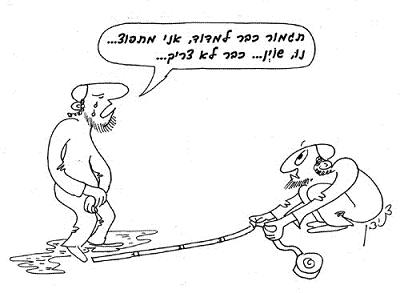
A person who prayed in a field, on the road, or on the side of a pathway is permitted, after finishing his prayers, to urinate in the same place in which he prayed. He need not treat the place in which he prayed as a sanctified place in which one is forbidden to urinate, as he would a synagogue; the place is ordinary, for the prayer there was ad-hoc and one-off.
This ruling was given by the sage Rav Judah. The scholar Rav Yosef said that this ruling is not innovative and says nothing which cannot be concluded from the words of the early sages (Tanaaim), who stated that only a synagogue, a place set aside for regular prayers, is sanctified, and that a temporary spot for prayers has no sanctity. Therefore one may urinate in the temporary location.
[In the era of the Talmudic sages the text of the Mishnah was not available in an organized fashion; it was written down as a book only toward the end of the Talmudic era. They would study the Mishnah orally instead. To help keep the Mishnah common knowledge, there were experts who would learn the Mishnah by heart and retell them before the sages. Therefore the Talmud will sometimes include the phrase “The man who spoke the Mishnah before the sages said…”]
A scholar recited the Mishnah before the sage Rav Nachman: One who prays outside the synagogue — in a field or on the side of the road — goes four amah (two meters) from the place in which he prayed and there he may urinate. If he urinated before praying he must go four amah (two meters) from the place in which he urinated and only there may he pray.
The sage Rav Nachman told the man reciting the Mishnah that it is unreasonable to conclude that one praying outdoors must distance himself four amah from where he prayed before urinating. If this were the law, there would be no place in which one could urinate, for city residents customarily prayed outside, in various and random locations, so the whole city would be sanctified and one would be forbidden to urinate in all those spots. Due to this argument the sage wish to edit the Mishnah which was spoken before him and change it from “he should distance himself four amah to “He should wait [the time it would take him to walk] four amah [about two seconds].” The scholars asked: If we change the Mishnah to be “wait” instead of “distance,” a new problem arises. One who urinates must wait two seconds and only then may pray, since after a person finishes urinating drops of urine still issue from his sex organ. Therefore he must wait two seconds until the urine stops dripping. But why must a person who finishes praying wait two seconds before he urinates? Answer: the scholar Rav Ashi explained that even after a person finishes saying his prayers his heart is still involved in the prayer and his lips still whisper it. Therefore he should wait two seconds, and only then urinate.
(Babylonian Talmud, Tractate Megillah 27b)
